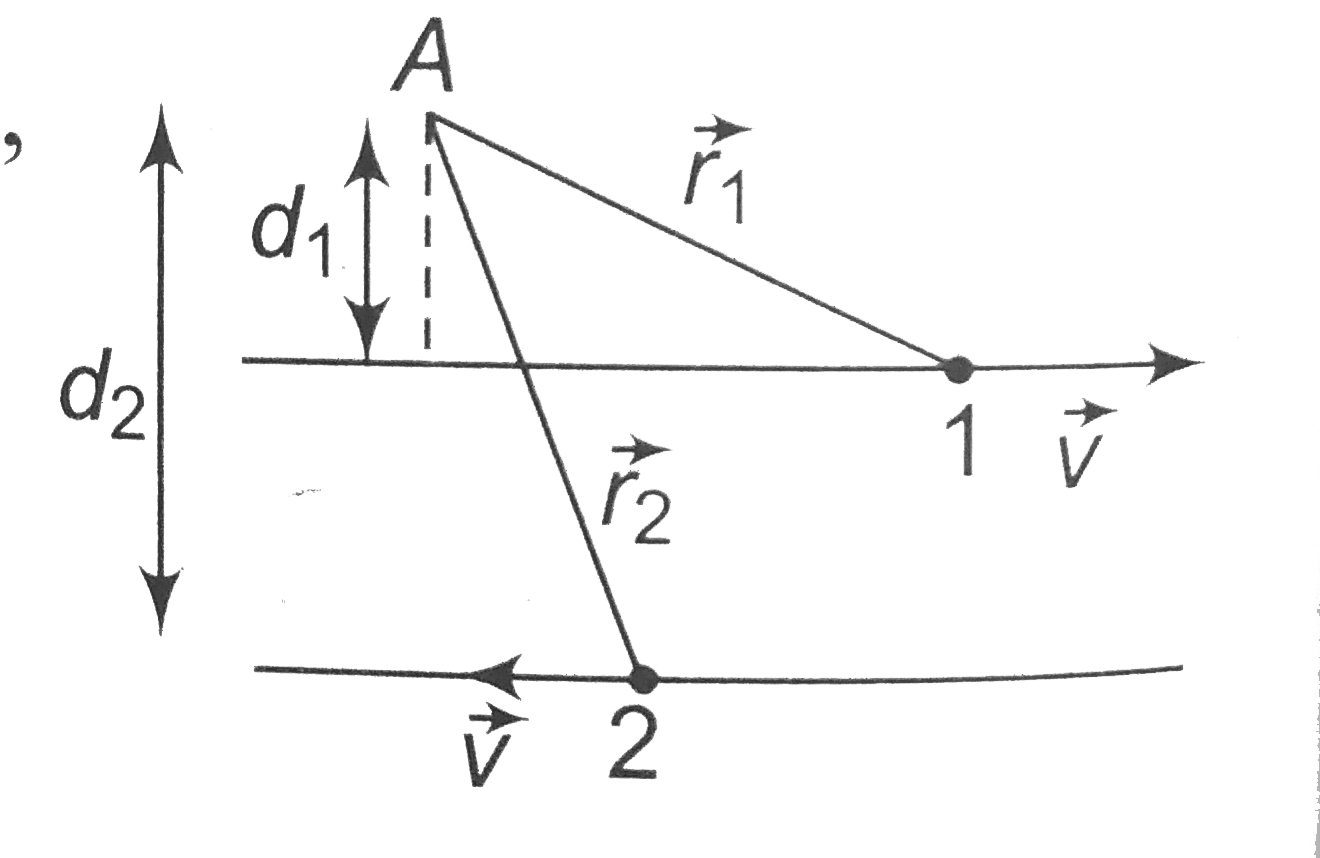Figure shows two identical particles 1 and 2, each of mass m, moving in opposite directions with same speed →V along parallel lines. At a particular instant, →r1 and →r2 are their respective position vectors drawn from point A which is in the plane of the parallel lines. Which of the following is the correct statement ?
 .
.
Agular momentum I1 of particle a about A is I=mv(d1)⊙
Angular momentum I2 of particle 2 about A is I2=mvr2⊙
total angular momentum of the system about A is I=mv(r1+r2)⊙
total angular momentum of the system about A is I=mv(d2−d1)⊗
The correct Answer is:a,b
the angular momentum L of a particle with respect toorigin is deined to be L=r×p where , r is the podsition vector of the particle and p is the linear momentum , The direction of L is is perpendicular to both d r and p by right hand rule .
For particle 1. I1=r1×mv is not of plane of the paper and perpendicular to r1 and p(mv) Similarly I2=r2×m(−v) is into the plane of the paper and perpendicular to r2and−p
Hence , total angular momentum
l=l1+l2=r1×mv+(−r2×mv)
|l|=mvd1−mvd2asd2>d1 total angular momentum will be inward
Hence I=mv(d2−d1)⊗
note : in the expression of angular momentum I=r×p the direction of l is taken by right hand rule .
Topper's Solved these Questions
- SYSTEM OF PARTICLES AND ROTATIONAL MOTION BOOK - NCERT EXEMPLAR ENGLISHCHAPTER - SYSTEM OF PARTICLES AND ROTATIONAL MOTION EXERCISE - very short answer type questions
18 Videos
- SYSTEM OF PARTICLES AND ROTATIONAL MOTION BOOK - NCERT EXEMPLAR ENGLISHCHAPTER - SYSTEM OF PARTICLES AND ROTATIONAL MOTION EXERCISE - Long answer type questions
12 Videos
- OSCILLATIONSBOOK - NCERT EXEMPLAR ENGLISHCHAPTER - OSCILLATIONSEXERCISE - All Questions
36 Videos
- THERMAL PROPERTIES OF MATTERBOOK - NCERT EXEMPLAR ENGLISHCHAPTER - THERMAL PROPERTIES OF MATTEREXERCISE - Very short Answer type Questions
15 Videos
Similar Questions
P and Q are two points with position vectors 3→a−2→b and →a+→b respectively. Write the position vector of a point R which divides the line segment PQ in the ratio 2:1 externally.
View SolutionTwo particles each of mass m and speed v, travel in opposite direction along parallel lines separated by a distance d. Show that the vector angular momentum of this system of particles is the same about any point taken as origin.
View Solution
Knowledge Check
Let →aand→b be the position vectors of A and B respectively. If C is the point 3→a−2→b, then which one of the following is correct?
AC is in between A and BBA is in between C and BCB is in between A and CDA, B, C are not collinearLet →aand→b be the position vectors of A and B respectively. If C is the point3→a−2→b, then which one of the following is correct?
AA. C is in between A and BBB. A is in between C and BCC. B is in between A and CDD. A, B and C are not collinearLet →v1,→v2,→v3,→v4 be unit vectors in the xy-plane, one each in the interior of the four quadrants. Which of the following statements is necessarily ture. ?
A→v1+→v2+→v3+→v4=0BThere exist i, j with 1≤i<j≤4 such →vi+→vj is in the first quadrantCThere exits i, j with 1≤i<j≤4 such that →vi⋅→vj<0DThere exits i, j with 1≤i<j≤4 such that →vi⋅→vj>0
Two particles each of mass m and speed v, travel in opposite direction along parallel lines separated by a distance d. Show that the vector angular momentum of this system of particles is the same about any point taken as origin.
View SolutionTwo particles each of mass m and speed v, travel in opposite direction along parallel lines separated by a distance d. Show that the vector angular momentum of this system of particles is the same about any point taken as origin.
View SolutionP and Q are two points with position vectors 3→a−2→b and →a+→b respectively. Write the position vector of a point R which divides the line segment PQ in the ratio 2:1 externally.
View SolutionIf →a,→b are the position vectors of the points (1,−1),(−2,m), find the value of m for which →a and →b are collinear.
View SolutionIf →a,→b are the position vectors of the points (1,−1),(−2,m), find the value of m for which →a and →b are collinear.
View Solution
